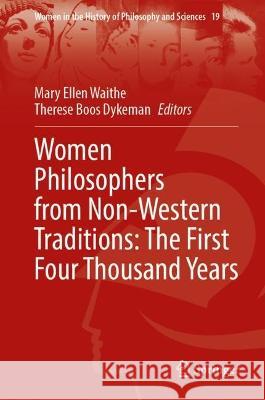Women Philosophers from Non-Western Traditions: The First Four Thousand Years » książka
Women Philosophers from Non-Western Traditions: The First Four Thousand Years
ISBN-13: 9783031285622 / Angielski
This book presents the views of 22 women philosophers from outside the Greco-Roman and Judeo-Christian worlds. These eminent thinkers are from Mesopotamia, India, Tibet, China, Korea, Japan,Australia, America, the Philippines and Nigeria. Six philosophers, the earliest of whom predates the Greek pre-Socratics by two thousand years, lived at “the dawn of philosophy”; another six from late Antiquity through the Classical period; five more taught and wrote during the Middle Ages up to the Age of Exploration, and yet five others were active during the modern period to the mid-twentieth century. Most belonged to major philosophical traditions: Hinduism, Buddhism, Confucianism, Taoism, Zen, or Sufism. The chapters of the book describe the life and views of the philosophers, outline the fundamental features of their respective schools, and contain translations of their writings. The book is intended for scholars of philosophy and women’s studies who wish to expand their knowledge of non-Western philosophical traditions and is ideally suited for undergraduate education. Comprehensive multilingual bibliographies of carefully documented sources offer scholars many promising resources for further research.
This book presents the views of 22 women philosophers from outside the Greco-Roman and Judeo-Christian worlds. These eminent thinkers are from Mesopotamia, India, Tibet, China, Korea, Japan,Australia, America, the Philippines and Nigeria. Six philosophers, the earliest of whom predates the Greek pre-Socratics by two thousand years, lived at “the dawn of philosophy”; another six from late Antiquity through the Classical period; five more taught and wrote during the Middle Ages up to the Age of Exploration, and yet five others were active during the modern period to the mid-twentieth century. Most belonged to major philosophical traditions: Hinduism, Buddhism, Confucianism, Taoism, Zen, or Sufism. The chapters of the book describe the life and views of the philosophers, outline the fundamental features of their respective schools, and contain translations of their writings. The book is intended for scholars of philosophy and women’s studies who wish to expand their knowledge of non-Western philosophical traditions and is ideally suited for undergraduate education. Comprehensive multilingual bibliographies of carefully documented sources offer scholars many promising resources for further research.











